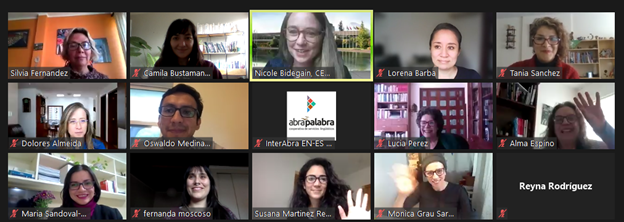It is important to analyze the gender distributional impacts of fiscal policies in response to the COVID-19 crisis, says ECLAC
Work area(s)
Topic(s)
Within the framework of the 29th Annual Congress of the International Association for Feminist Economics Sustaining Life: Challenges of Multidimensional Crisis, Nicole Bidegain Ponte moderated the panel “From crisis to opportunity? Fiscal stimulus packages and Financing for Gender Equality in Latin America in the COVID-19 context”. This event was organized by UN Women virtually on June 22, 2021.

The COVID-19 pandemic has caused a severe drop in Latin America and the Caribbean GDP’s, which represents the worst crisis in its recent history and by 2020 has implied a setback of 18 years in women’s labor participation, as well as an increase in informality and unemployment. The overwhelming exit of women from the labor market is linked to the overburden of domestic and care work which has fallen disproportionately on them. In addition, according to ECLAC data, six out of ten women in the region are employed in sectors with the highest risk in the pandemic —trade, manufacturing, tourism, and domestic work— which are, at the same time, those that are experiencing the greatest challenges for recovery. Fiscal policy has a key role to play in contributing to a recovery with gender equality and sustainability.
These were some of the contributions made by Nicole Bidegain Ponte, ECLAC Social Affairs Officer, to the 29th Annual Congress of the International Association for Feminist Economics (IAFFE), in which she moderated the panel “From crisis to opportunity? Fiscal stimulus packages and Financing for Gender Equality in Latin America in the COVID-19 context”. The specialist also highlighted that, although the countries of Latin America and the Caribbean have increased their public spending to face the crisis, in particular, through transfers to protect people's income and the productive fabric, it is necessary to deepen the analysis on the gender distributional impact of these fiscal measures.
In accordance with the Montevideo Strategy, ECLAC Member States have committed to design budgets with a gender perspective to ensure sufficient, non-transferable, sustainable resources that cover all levels and areas of public policy aimed at reversing gender inequalities and guaranteeing women’s rights. In the current situation, Nicole Bidegain explained, it is even more important to allocate sufficient resources for key policies and services for women, such as sexual and reproductive health services, services to prevent and address gender-based violence against women, and in particular policies and care services. To this end, it is necessary to explore tools to expand the fiscal space to meet growing financing needs, such as increasing the progressivity of tax systems, increasing tax burden on the highest-income sectors, and strengthening regional cooperation to mobilize resources and combat tax evasion and illicit financial flows.
During her speech, María Dolores Almeida, UN Women public finance consultant, presented advances in the analysis of the gender dimension of fiscal measures in Colombia, Ecuador and Mexico. In addition, she stated that according to the preliminary findings of the analysis, there are few fiscal measures implemented in response to the crisis that have had a gender focus, although some policies that have increased spending have had positive externalities for women.
Meanwhile, Silvia Fernández made a presentation on budget allocations for gender equality in public budgets in Latin America and the Caribbean. In her presentation, she highlighted that in 21 of 22 Latin American countries it is possible to identify whether there is spending for gender equality. However, she stated that budgets are complex instruments to permeate by notions outside the neoclassical perspective, such as the gender approach.
Lorena Barba and Tania Sánchez, UN Women consultants on gender-sensitive budgets, presented good practices in Latin America and the Caribbean in relation to monitoring mechanisms for financing for gender equality and recalled the indicator to determine which countries have mechanisms to monitor the allocation of resources for gender equality. The panelists noted that these advances allow governments to make greater efforts to make visible what they are doing, both in the executive and legislative branches, and to expand investment to issues such as employment and access to credit.
At the close of the session, Bidegain Ponte highlighted that ECLAC has called for spending to be strategically oriented to protect the income and employment of women affected by the crisis and their participation in the recovery processes, through affirmative measures to the access of women's businesses to public procurement systems and investment in dynamic sectors with a gender focus. One of these is the care economy, a sector that generates multiplier effects on well-being, redistribution of time and income, women’s labor participation and tax collection.